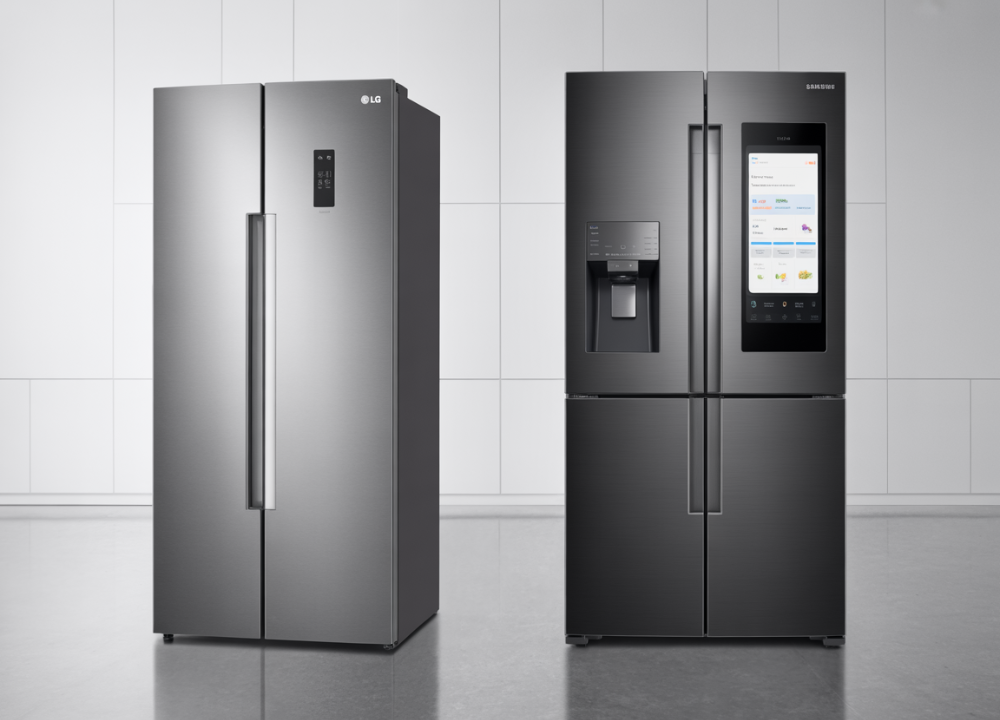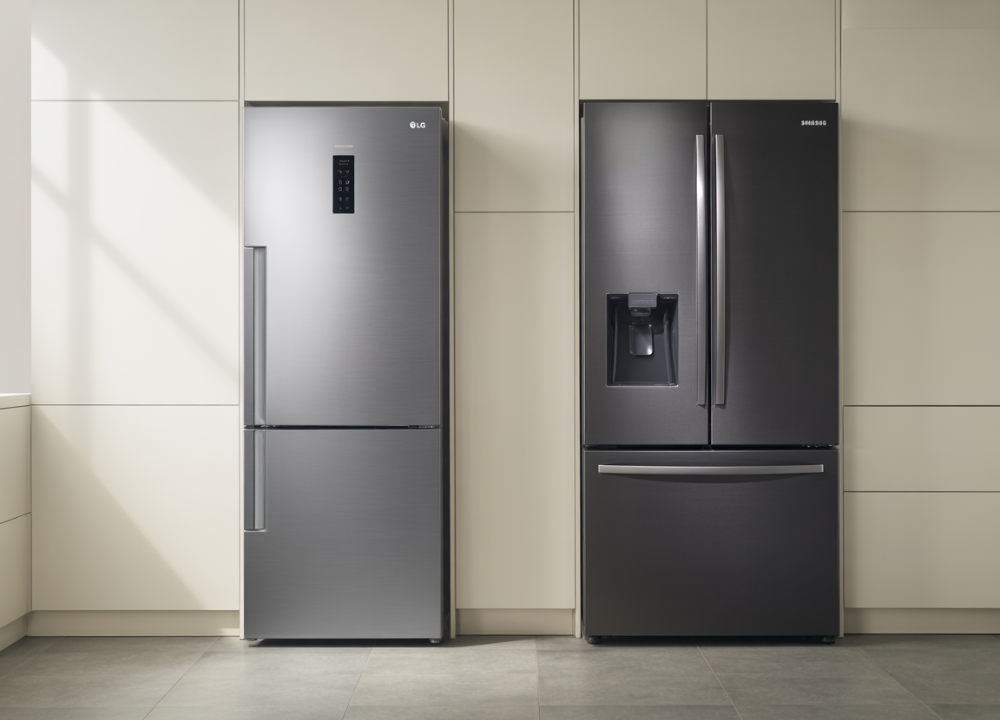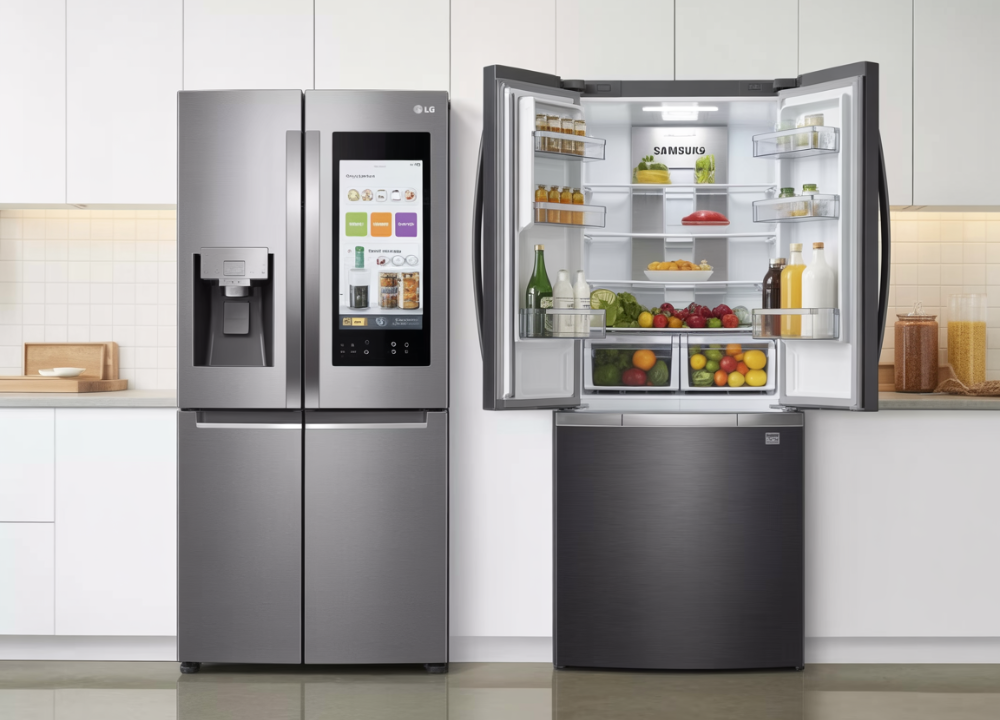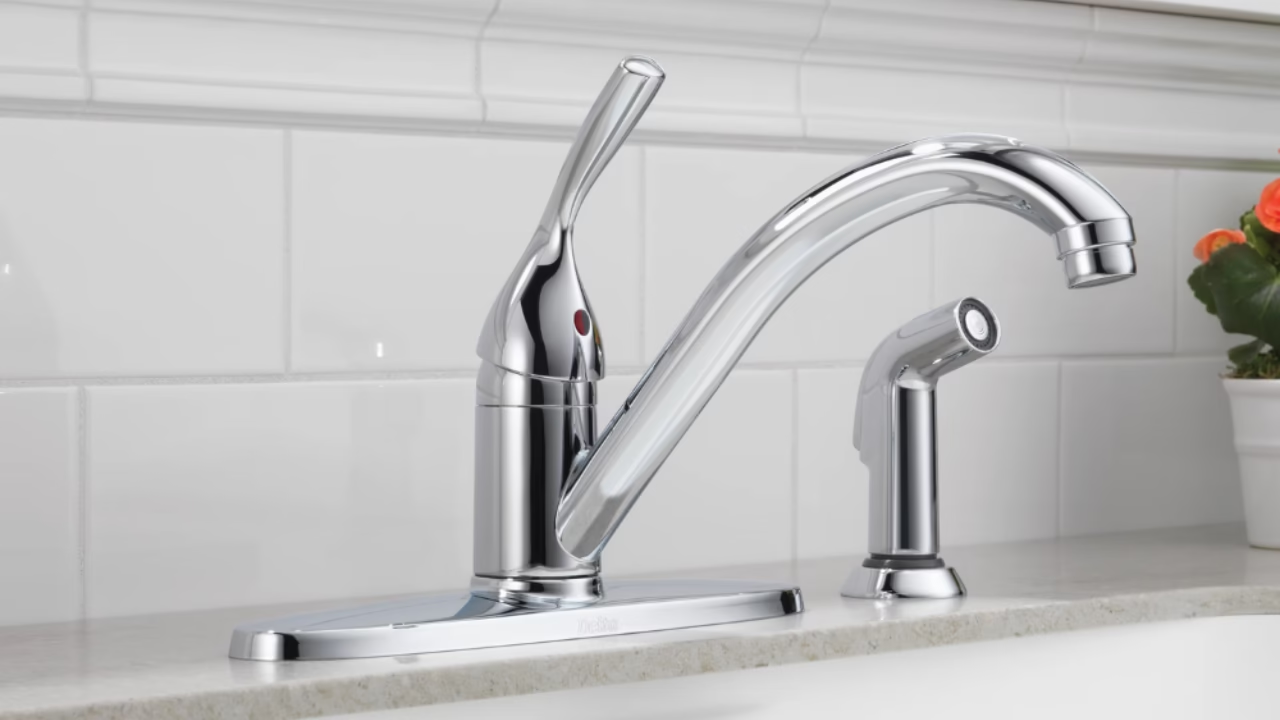Two brands will always rise to the top when you need to upgrade your kitchen by having a sure and solid refrigerator, feature-laden and elegant at the same time; LG and Samsung. They both are the leaders of the industry that tends to break the limits of smart technology, sustainability, and sleek design.
Are you interested in advanced cooling systems, tons of space, smart refrigerators, or a refrigerator that suits your way of life? These are some of the issues to consider in the choice between the LG refrigerator and Samsung refrigerator. This comparison will allow you to learn their main differences, peculiarities, andES total worth to be able to choose a right option concerning your kitchen and family.
Smart Functionality: LG ThinQ vs. Samsung Family Hub

LG ThinQ
LG integrates its ThinQ smart technology into its refrigerators for enhanced convenience. With the ThinQ app, users can:
- Check and control temperatures remotely.
- Monitor energy usage.
- Receive proactive maintenance alerts.
- Enjoy seamless compatibility with Google Assistant, Alexa, and Apple HomeKit.
This makes LG ThinQ a versatile option for households already equipped with diverse smart home devices.
Samsung Family Hub
Samsung takes smart innovation to the next level with its Family Hub refrigerators:
- Built-in touchscreen for grocery management, recipe browsing, and to-do lists.
- Internal cameras that allow you to see the contents of your fridge remotely.
- Integration with Samsung SmartThings for full control over connected home devices.
- Enhanced entertainment features, such as streaming music or mirroring your smart TV.
Verdict: While LG ThinQ offers broader smart home compatibility, Samsung Family Hub is ideal for tech-savvy users who enjoy a centralized smart home experience.
Storage Configurations to Match Your Needs
Finding the right storage configuration can make all the difference in a refrigerator’s usability. Both brands excel in offering versatile options, but here’s how they differ:
LG’s Highlights:
- Door-in-Door Access minimizes air loss by letting you easily access frequently used items.
- The Craft Ice Maker produces round, slow-melting ice for cocktails or parties.
- Highly organized compartments in bottom-freezer models simplify freezer storage.
Samsung’s Highlights:
- The FlexZone Drawer provides adjustable temperature settings, switching between refrigeration and freezing modes as needed.
- The Bespoke Series lets you customize the refrigerator’s panel colors and materials to suit your kitchen aesthetic.
- Family Hub models often include enhanced interior shelving for larger families or bulk storage.
Verdict: Go for LG if you want organization-specific features. Choose Samsung for customizable designs and greater flexibility in compartment use.
Temperature Management and Cooling Technology

Fresh food preservation relies heavily on advanced temperature and humidity control. Here’s how LG and Samsung compare in this department:
LG’s Cooling Technology:
- Linear Cooling reduces temperature fluctuations to maintain precise cooling.
- Door Cooling+ ensures items stored in the fridge door stay as cold as the interior.
- The Multi-Air Flow System distributes cold air evenly, preventing hotspots.
Samsung’s Cooling Technology:
- Triple Cooling System uses separate evaporators to maintain optimal humidity in different compartments while avoiding odor mixing.
- Metal Cooling Plate stabilizes internal temperatures quickly, preserving perishables even when the door is frequently opened.
Verdict: Both brands perform impressively. LG provides consistent, energy-efficient cooling, while Samsung offers superior humidity management and odor control.
Design and Aesthetics
Your refrigerator isn’t just a functional appliance; it’s also a centerpiece of your kitchen. Both LG and Samsung have made excellent strides in combining form with function.
LG
LG refrigerators tend to prioritize functional designs.
- The Instaview Panel lets you quickly see inside without opening the door, reducing energy waste.
- Water and ice dispensers are discreetly integrated into the design to enhance practicality.
Samsung
Samsung focuses on modern, minimalist designs.
- Fingerprint-resistant finishes and customizable Bespoke panels.
- Sleek, hidden handles that elevate the overall look of your kitchen.
Verdict: For sleek, futuristic customization, Samsung is the go-to. LG is a better choice if functional design enhancements are your priority
Performance and Reliability
Performance and longevity are critical for an investment as significant as a refrigerator.
LG
LG stands out for its linear compressor technology, which has fewer moving parts:
- Quiet operation.
- Better energy efficiency.
- Enhanced durability reduces the likelihood of repairs.
Samsung
Samsung refrigerators are known for their robust performance.
- Advanced features like the FlexZone drawer are particularly appreciated by large households.
- However, some reviewers mention that repairs involving Samsung’s advanced smart features can be complicated.
Verdict: LG has a slight edge in reliability and energy efficiency, while Samsung’s performance shines in high-tech innovations for larger families.
What Are Customers Saying?
Customer feedback gives valuable insights into real-world experiences with each brand:
LG
Pros:
- Highly praised for functional storage solutions and exceptional energy efficiency.
- Many customers love the InstaView and Door-in-Door features.
Cons:
- Some customers report occasional issues with ice makers in certain models.
Samsung
Pros:
- Loved for stylish designs, customizable options, and smart technology features.
- The Family Hub interface gets rave reviews from tech enthusiasts.
Cons:
- Occasional connectivity issues with smart features have been noted.
Verdict: LG scores in practicality and energy efficiency, while Samsung stands out for tech-forward designs and sleek aesthetics.
Pricing and Warranties
Cost and warranty coverage are essential considerations before making a purchase.
Pricing
- LG offers slightly more affordable entry-level models, making them accessible for a range of budgets.
- Samsung refrigerator tend to be priced higher, particularly models with Family Hub or Bespoke customization.
Warranty Comparison
- LG provides a 10-year warranty on its compressor in addition to a 1-year standard parts and labor warranty.
- Samsung offers similar warranty terms, with occasional promotional extensions.
Verdict: LG’s affordability and longer-established warranties make it attractive for budget-conscious buyers. Samsung, while pricier, justifies the cost through innovative features.
Conclusion About Samsung Refrigerator
Choosing between LG and Samsung ultimately depends on your priorities:
- Choose LG if you value reliable performance, innovative storage solutions, and greater energy efficiency.
- Choose Samsung if you prioritize stylish designs, customizable options, and cutting-edge technology.
No matter which one you choose, you’re guaranteed a high-quality refrigerator that combines functionality and style.
Looking to save time comparing models? Visit [Link] to explore the best LG and Samsung refrigerator, compare specifications, and find your perfect fit today!




One thought on “LG Refrigerator vs. Samsung Refrigerator Comparison In 2025”